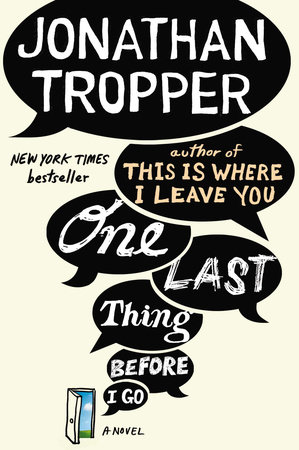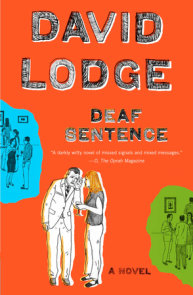READERS GUIDE
Questions and Topics for Discussion
INTRODUCTION
In One Last Thing Before I Go is that rare thing: a brilliant success about a total failure. The novel chronicles a week in the life of its chronically inept protagonist Silver, a one-time rock star drummer and the author of the hit song, “Rest in Pieces.” As the novel begins, Silver’s glory days are long gone. Divorced, disheveled, sliding into a desperately lonely middle age, Silver inhabits the comically named Versailles, a depressing apartment complex inhabited mostly by men still reeling from their divorces or hoping for a miraculous reversal of fortune.
Things could hardly be worse for Silver. After their one hit song, the lead singer of the Bent Daises ditched the band for a fabulously successful solo career. His ex-wife Denise is marrying Rich, a surgeon with lots of money who Silver tries hard to hate even though Rich is one of the few people who likes him. His daughter Casey, who he has neglected for years, will barely speak to him. Rich is now more of a father to her than Silver has ever been. His only real friends are the oversexed Jack and paunchy alcoholic Oliver, both of them, like Silver, very unhappily divorced.
But things do get worse-a lot worse. Casey comes to him with the news that she’s pregnant, seeking advice from the man whose track record of bad decisions speaks for itself. Soon after, Silver suffers a min-stroke and is found to have an aortic dissection, which will very likely cause a fatal aneurism if it’s not operated on. This dire news is delivered by Rich himself, the man who will marry Silver’s wife, “just the sort of karmic fart that is emblematic of his life these days” [p. 71]. Rich offers to perform the surgery needed to save Silver’s life, but Silver declines, reasoning that he’s rather not be restored to the sorry life he’s been living for the past seven years.
His family tries hard to convince him to stay alive, organizing an intervention that goes horribly wrong, and accusing him of selfishness. His father, a rabbi, drags him to a bris, a bar mitzvah, a wedding, and a funeral, in an attempt to involve him in life’s essential rites of passage. And still Silver resists. Faced with certain death, he resolves to be a better man, a better father, to fall in love-and to die.
The rest of the novel tracks Silver’s attempts to complete the ultimate bucket list. His efforts are both aided and undercut by an inability to maintain a clear boundary between thinking and speaking. His mini-stroke has apparently killed his internal editor, and he blurts out, with comic and sometimes disastrous effects, everything that pops into his head. On the one hand, he speaks the truth (Jack says he liked him better when he knew how to lie); on the other, he offends practically everyone. He gets closer to Casey, but ends up in a fistfight with Rich. He attends a wedding at his father’s insistence, makes a fool of himself, but then delivers a heartfelt speech to Casey, and ends up reliving a moment of rock stardom as the wedding band spontaneously breaks into “Rest in Pieces.”
It’s a strange journey Silver is on, and the twists and turns the novel takes, as well as the overarching uncertainty about whether or not Silver will live, keep the reader in a state of suspenseful expectation.
Along the way, One Last Thing Before I Go offers a wonderfully revealing glimpse into the psyche of a middle-aged divorced man, living in the fading afterglow of a brief moment of fame, who has messed up his marriage, been a bad father to his only daughter, and is now fully aware of just what he’s lost. Indeed, the novel can be read as an extended exploration of failure and regret-an exploration that has largely been banished from an American culture obsessed with youth, glamour, the future, and what passes for success. But it is also a brilliantly insightful novel about what one does when given a choice between death and life, the ultimate escape and a chance to set things right.
ABOUT JONATHAN TROPPER
Jonathan Tropper is the internationally bestselling author of six novels: Plan B, The Book of Joe, Everything Changes, How To Talk to a Widower, This Is Where I Leave You, and One Last Thing Before I Go. His books have been translated into over twenty languages. This Is Where I Leave You, which he adapted as a feature film for Warner Brothers, is scheduled to shoot this summer with Shawn Levy directing. Jonathan is currently adapting the New York Times bestseller, One Last Thing Before I Go for JJ Abrams and Paramount Pictures. He is also the co-creator and executive producer of the television show Banshee, which premiered on Cinemax in January 2013. He lives in Westchester, NY.
A CONVERSATION WITH JONATHAN TROPPER
Q. You’ve had a great deal of professional success, as a bestselling author and screenwriter. How were you able to write about failure so convincingly in One Last Thing Before I Go?
I think anyone with any measure of success has to have known failure along the way. And writers, at any level, know failure every day, whether it’s a bad day where nothing you wrote is worth anything, or it’s a rejection of some kind. And personal failures, which is what this book is really about, bear no relation to professional success.
Q. How did Silver emerge for you as a character? What drew you to write about someone in his particular circumstances?
I wanted to write a book about what redemption looks like when it’s really too late to fix your mistakes. In all of my other books, we meet the protagonist either at the moment of his mistake, or in the aftermath of it. But here is someone who made his mistakes almost a decade ago, and there’s no going back, no fixing the damage that’s been done. So I was really interested in exploring what that feels like, the underlying regret that informs every day of his life – and how someone in that circumstance can find some measure of peace or redemption.
Q. All the characters in the novel, but Silver especially, experience mixed emotions. Looking around the restaurant where he used to go when he was married, Silver feels “both relief and regret” [p. 141]. When Lily invites him to her show, he feels “simultaneously hopeful and angry at himself for being so” [p. 281]; observing Denise and Casey at the wedding he feels “jealous and grateful and flushed with shame all at once” [p. 301]. Could you talk about this prevalence of mixed emotions? Does rendering the often contradictory feelings of your characters seem more true to life than having them be dominated by a single emotion? Was this a conscious strategy?
I don’t think strategy is really the right word. It’s my opinion that it’s very rare to be utterly consumed by a single, concrete emotion. We’re just not wired like that. So at any given point, our prevailing emotional state is being undercut by secondary and tertiary considerations. So when I read about characters lost in one emotion, I tend to feel the “writing,” instead of believing in a fully wrought, three dimensional character.
Q. Why did you decide to leave the novel so open-ended? Were you tempted to resolve it, one way or the other?
(Spoiler Alert!) To me, there was no other way to end this story. Silver has finally taken some new steps, he has changed, he has acquired the wisdom and purpose that he was lacking when we met him. He has, in his own quiet way, been redeemed. So the truth is, at this point, whether he lives or not is immaterial, from the perspective of narrative.
Q. This novel is such a joy to read, it seems like it would have been great fun to write. Was it? How long did you work on it?
Not as fun as you would think. Certainly there were parts that were fun to write, and when it’s going well it always feels good. But this is a darker book, thematically, than my past novels, and sometimes diving into those themes took it’s toll. I was also working on the script for This Is Where I Leave You, and my television show, and I was pretty much writing around the clock. So while I was very happy with the ultimate result, I was a bit frazzled and stressed and so I don’t think “fun” would really be the right word.
Q. The story takes so many surprising turns-did you plot these out or did they just emerge in the natural trajectory of the writing?
I rarely outline at the outset – though I always have a pretty general idea of where I’m headed. Every so often, while I’m writing it one way, an idea will occur to me to take it in another direction, very spontaneously. I find it’s a good practice to follow those impulses. They don’t always work, but when they do, they can be fantastic.
Q. How do you regard the new novel in relation to your previous work? Does it enter new territory for you?
Yes. This novel is somewhat darker than my previous ones – not less hopeful, but I had to work harder to find the hope. This one deals with regret and the passage of time in a way my others haven’t. It’s still funny, but also a bit more tragic. And, unbelievably, this is the first of my books that I’ve written in the third person, which freed me up to get out of my protagonists head and into varied points of view, which I really enjoyed.
Q. One Last Thing Before I Go seems like a perfect fit for the big screen. Could you talk about the process of adapting the novel for film? Can you tell us who is going to play Silver? When will the film start shooting?
It was a tricky adaptation. So much of the novel centers on Silver’s compromised thought processes – his raging internal monologue, none of which can make it into the movie. So it took a lot of thought, and then some trial and error to really land on the right balance that would work in a film. It’s too early to publicly discuss the potential casting, so I’ll just say that what has been discussed is very exciting and unexpected. JJ Abrams will be producing the movie, and it’s been a blast working with him – he’s a filmmaker I’ve always wanted to work with. And Mike Nichols, one of my idols, is in talks to direct. So It’s all still in the early stages where everything can fall through at any moment, but right now it’s looking very exciting.
Q. What can readers expect from you next?
Well, I’m answering these questions on the set of This Is Where I Leave You, which has a dream cast and should be out in about a year. In the meantime, I’ve been getting ready to dive into a new novel. I haven’t cracked it yet, but I know the basic premise and I’m starting to get very excited about it. And for those who are watching Banshee, our second season airs in January 2014.
DISCUSSION QUESTIONS




















